External links
| | This article about a political documentary film is a stub. You can help Wikipedia by expanding it. |
- ↑ "Millhouse (Original Soundtrack of Film on Richard Nixon)". Smithsonian Folkways Recordings. Retrieved August 13, 2022.
Millhouse: A White Comedy is a 1971 documentary by Emile de Antonio following Richard Nixon's political career from his election to the House of Representatives in 1946 to his election as President of the United States in 1968. It begins with Nixon's "last press conference" in 1962 after his loss in the race for Governor of California in which he famously said, "You won't have Dick Nixon to kick around anymore." Then a collage of videos show Nixon's trajectory from his House campaign to his involvement in the Alger Hiss case, election to the Senate in 1950, election as Vice President in 1952 including the full Checkers speech, campaign for the presidency in 1960, campaign for Barry Goldwater's presidential candidacy in 1964, and his triumphant election as President in 1968 as the "New Nixon". The film featured interviews but no voice-over.
The title is a pun on Nixon's middle name, Milhous.
In 1979, Smithsonian Folkways released a soundtrack of the film including clips and audio from newsreels, as well as liner notes of text of the soundtrack and facsimiles of newspaper clippings and notes. [1]

Richard Milhous Nixon was the 37th president of the United States, serving from 1969 to 1974. A member of the Republican Party, he previously served as a representative and senator from California and was the 36th vice president from 1953 to 1961 under President Dwight D. Eisenhower. His five years in the White House saw reduction of U.S. involvement in the Vietnam War, détente with the Soviet Union and China, the first manned Moon landings, and the establishment of the Environmental Protection Agency and Occupational Safety and Health Administration. Nixon's second term ended early, when he became the only president to resign from office, following the Watergate scandal.

The 1968 United States presidential election was the 46th quadrennial presidential election, held on Tuesday, November 5, 1968. The Republican nominee, former vice president Richard Nixon, defeated the Democratic nominee, incumbent vice president Hubert Humphrey, and the American Independent Party nominee, former Alabama governor George Wallace.

The 1972 United States presidential election was the 47th quadrennial presidential election. It was held on Tuesday, November 7, 1972. Incumbent Republican President Richard Nixon from California defeated Democratic U.S. Senator George McGovern of South Dakota. Until the 1984 election, this was the largest margin of victory in the Electoral College in a U.S. presidential election, and as of 2022, it remains the last time a presidential candidate captured more than 60% of the popular vote. It was also the first presidential election that would see California move ahead of New York in the number of each state's electoral votes, a gap that has since widened.
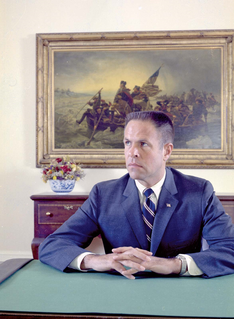
Harry Robbins "Bob" Haldeman was an American political aide and businessman, best known for his service as White House Chief of Staff to President Richard Nixon and his consequent involvement in the Watergate scandal.

John Daniel Ehrlichman was Counsel and Assistant to the President for Domestic Affairs under President Richard Nixon. Ehrlichman was an important influence on Nixon's domestic policy, coaching him on issues and enlisting his support for environmental initiatives.
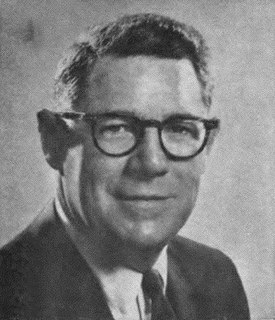
Clark MacGregor was a Republican U.S. Representative from Minnesota's 3rd Congressional District for five terms from 1961 to 1971.
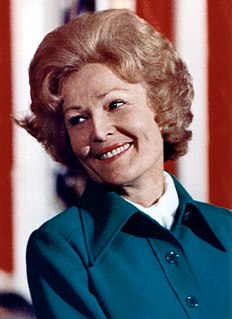
Thelma Catherine "Pat" Nixon was First Lady of the United States from 1969 to 1974 as the wife of President Richard Nixon. She also served as Second Lady of the United States from 1953 to 1961 when her husband was vice president.
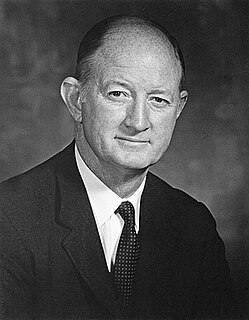
Winton Malcolm Blount Jr., known as Red Blount, was the United States Postmaster General from January 22, 1969, to January 1, 1972. He founded and served as the chief executive officer of the large construction company, Blount International, based in Montgomery, Alabama.
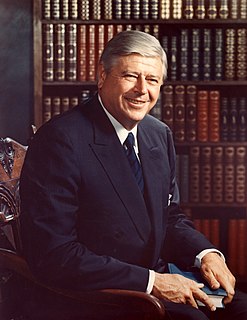
Rogers Clark Ballard Morton was an American politician who served as the U.S. Secretary of the Interior and Secretary of Commerce during the administrations of presidents Richard M. Nixon and Gerald R. Ford, Jr., respectively. He also served as a member of the U.S. House of Representatives from Maryland.

The 1970 United States Senate elections was an election for the United States Senate, taking place in the middle of Richard Nixon's first term as President. The Democrats lost a net of three seats, while the Republicans and the Conservative Party of New York picked up one net seat each, and former Democrat Harry F. Byrd Jr. was re-elected as an independent.
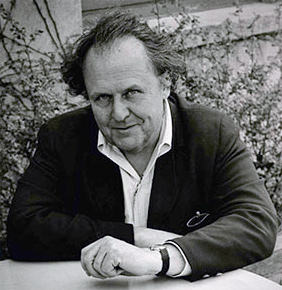
Emile Francisco de Antonio was an American director and producer of documentary films, usually detailing political, social, and counterculture events circa 1960s–1980s. He has been referred to by Randolph Lewis as, "…the most important political filmmaker in the United States during the Cold War."
Smithsonian Folkways is the nonprofit record label of the Smithsonian Institution. It is a part of the Smithsonian's Smithsonian Center for Folklife and Cultural Heritage, located at Capital Gallery in downtown Washington, D.C. The label was founded in 1987 after the family of Moses Asch, founder of Folkways Records, donated the entire Folkways Records label to the Smithsonian. The donation was made on the condition that the Institution continue Asch's policy that each of the more than 2,000 albums of Folkways Records remain in print forever, regardless of sales. Since then, the label has expanded on Asch's vision of documenting the sounds of the world, adding six other record labels to the collection, as well as releasing over 300 new recordings. Some well-known artists have contributed to the Smithsonian Folkways collection, including Pete Seeger, Ella Jenkins, Woody Guthrie, and Lead Belly. Famous songs include "This Land Is Your Land", "Goodnight, Irene", and "Midnight Special". Due to the unique nature of its recordings, which include an extensive collection of traditional American music, children's music, and international music, Smithsonian Folkways has become an important collection to the musical community, especially to ethnomusicologists, who utilize the recordings of "people's music" from all over the world.

Richard Nixon's tenure as the 37th president of the United States began with his first inauguration on January 20, 1969, and ended when he resigned on August 9, 1974, in the face of almost certain impeachment and removal from office, the only U.S. president ever to do so. He was succeeded by Gerald Ford, whom he had appointed vice president after Spiro Agnew became embroiled in a separate corruption scandal and was forced to resign. A prominent member of the Republican Party from California who previously served as vice president under Dwight D. Eisenhower, Nixon took office following the 1968 presidential election, in which he defeated Hubert Humphrey, the then-incumbent vice president. Although he had built his reputation as a very active Republican campaigner, Nixon downplayed partisanship in his 1972 landslide reelection.

From January 24 to June 20, 1972, voters of the Democratic Party chose its nominee for president in the 1972 United States presidential election. Senator George McGovern of South Dakota was selected as the nominee through a series of primary elections, caucuses, and state party conventions, culminating in the 1972 Democratic National Convention held from July 10 to July 13, 1972, in Miami, Florida.

Operation Sandwedge was a proposed clandestine intelligence-gathering operation against the political enemies of U.S. President Richard Nixon's administration. The proposals were put together by Nixon's Chief of Staff H. R. Haldeman, domestic affairs assistant John Ehrlichman, and staffer Jack Caulfield in 1971. Caulfield, a former police officer, created a plan to target the Democratic Party and the anti-Vietnam War movement, inspired by what he believed to be the Democratic Party's employment of a private investigation firm.

Eugene Allen was an American waiter and butler who worked for the US government at the White House for 34 years until he retired as the head butler in 1986.

"Bring Us Together" was a political slogan popularized after the election of Republican candidate Richard Nixon as President of the United States in the 1968 election. The text was derived from a sign which 13-year-old Vicki Lynne Cole stated that she had carried at Nixon's rally in her hometown of Deshler, Ohio, during the campaign.

The 1968 presidential campaign of Richard Nixon, the 36th Vice President of the United States, began when Nixon, the Republican nominee of 1960, formally announced his candidacy, following a year's preparation and five years' political reorganization after defeats in the 1960 presidential election and the 1962 California gubernatorial election.

The 1946 United States elections were held on November 5, 1946, and elected the members of the 80th United States Congress. In the first election after the end of World War II, incumbent President Harry S. Truman and the Democratic Party suffered large losses. After having been in the minority of both chambers of Congress since 1932, Republicans took control of both the House and the Senate.
Richard Nixon, the 37th President of the United States, has inspired or been portrayed in numerous cultural works.